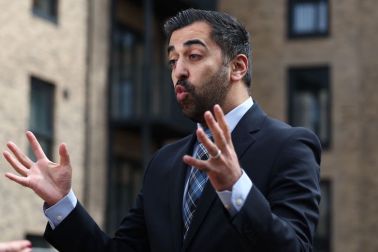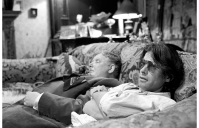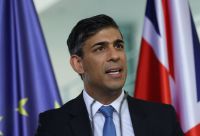Poetry and conflict are as old as each other. From war springs suffering and from suffering song. Fourteen months after the invasion of Iraq, the ancient association is as vibrant as ever. According to the Guardian, an anthology entitled 100 Poets Against the War has outstripped the opposition and become the nation’s most frequently borrowed book of poetry. Even now I hold the volume in my hand. And I read with tremulous fascination about its torrid and telling birth-throes.
Last year, on the eve of conflict, Laura Bush was favoured with a visitation from Apollo. The god of verse implanted in the First Lady’s mind the bright idea of staging a poetry recital at the White House. She consulted her husband and he duly gave his assent. Invitations were distributed, gallons of alcohol-free beer were ordered, white tables were spread with savoury nibbles, and a series of discrete cubicles were set up to fumigate the flea-ridden rhymesters as they passed into the fragrant West Wing. The poets meanwhile greeted the summons with a distinct lack of grace. They hatched a plot to subvert the eisteddfod and turn it into a protest against the coming war. The CIA, working a little more expeditiously than on 10 September, got wind of the conspiracy and with just 24 hours to spare it managed to warn the White House. The event was cancelled. The Bushes were saved from humiliation. But even as the bombers thundered over Iraq, the censored poets had set up a website and published a folio of their anti-war verse. The word spread. Within days many thousands of hits had been recorded as hermits and pacifists around the globe logged on from their bedsits, temples, ashrams, treetops, RMT offices and Algarve chalets. A phenomenon was born and the paperback version was soon cramming the shelves of our bookshops and libraries.
The volume looks a little dated to modern eyes. On a blood-red background the stark titles are shaped into pictograms, a bit like road-signs. The zeros of the ‘100’ resemble unexploded bombs, and beneath the word ‘WAR’ a white dove takes wing with an olive branch optimistically clamped in its beak. The poems bring to mind the ‘Protest and Survive’ literature of the 1980s. A peculiarity of the anti-nuke movement was its weird preoccupation with salacious images of death rather than with practical measures to diminish the dangers of Armageddon. The same cadaver-lust possesses these writers. ‘The smell and the smoke of burned flesh, blood/ and smouldering ruins blackened/ an incinerating sunset’ trills Ana Doina, a Romanian-born poet. ‘Children somewhere/ waiting for wounds/ eager for the hiss of napalm/ in their flesh/ the mutilating thump of shrapnel’ warbles Robert Priest, an award-winning singer-songwriter from Toronto. ‘They’ll cut off his cock and balls/ And stuff them in his screaming mouth’ suggests Tony Brown, weekly columnist for gotpoetry.com. The anthology ends with a singalong conducted by Phyllis Webb of Vancouver, ‘War cries cries war war/ war cries CRIES WAR CRIES there are there/ are still still still still.’
To be fair, the raw ingredients of poetry are certainly present here, namely language and feeling. Some of these efforts are not a million miles away from becoming poetry, in the way that a cow in a field is not a million miles away from becoming a hamburger. But a number of technical refinements will be required first: lyricism, music, metaphor, imagination, a sense of pace and rhythm, habits of verbal organisation, the feel for a resonant phrase that lingers in the mind after the page has been turned. All these are lacking from nearly all of these poems. Nor is there much political sophistication. Robin Lim (‘volunteer midwife in Indonesia and author of Eating Wisely For Two’) condemns the lies of her ‘so-called President’. And Di Brandt (‘teacher of creative writing and author of questions i asked my mother’) has a pithier summary of her leader: ‘like Herod, like Hitler, like Bush’. Ironic that the West’s leadership should be demonised here in exactly the same way that, according to the protesters, the West simplifies and vilifies Islam. The Coalition’s motives are likewise reduced to crude shorthand. Greed, oil-thirst, blood-lust and a batty desire to build a 1,000-year Reich from the profits of milkshakes and Mickey Mouse concessions. These are the only motives the anthology acknowledges. Perhaps it’s no surprise that these frolicsome peace-warriors have failed to grasp the wider objectives of the invasion. ‘Ken Waldman tours North America as Alaska’s Fiddling Poet’ is how one poet announces himself. Another holds down three jobs: ‘mother, writer and tapestry-weaver’. A third is kept busy as the ‘International Readings Co-ordinator for the UN Dialogue Among Civilisations through Poetry Undertaking’.
If these are the shock-troops of America’s internal opposition, then Rummy has nothing to worry about. But it’s hard to believe that any of these clog-dancing, muffin-making, sampler-sewing banjo-twangers have a genuine interest in halting the occupation of Iraq. Both in America and in Britain the efforts of the anti-war movement bear strange parallels with the endeavours of that other absentee fringe-group, Iraq’s Republican Guard. When the crunch came they did nothing. Hurt honour may have stung them into token spasms but essentially they stood by and watched the invaders get on with it.
On both sides of the Atlantic, the polls assure us, there are many millions who ardently oppose the occupation. But as the corpses stack up month after month, every one of these indomitable rebels meekly forwards a portion of their income to the treasury. Can you sincerely oppose a military action while bankrolling it? In Britain we were promised much civil argy-bargy. (Remember those posters ‘What To Do When War Breaks Out’?) So what happened? Lorries full of troops ply our motorways unopposed. No saboteurs languish in our military jails. The expected prayer-circles of chanting peaceniks have failed to enclasp our military compounds. Not a drawing pin has been laid on any RAF runway, nor has a single egg splattered a Royal Navy deck. This is the most insipid rebellion to have emerged in human history. ‘Grannies Against the Council Tax’ has more energy than ‘End the Occupation’. The lesson of the Guardian’s survey appears to be that the protesters are now so sunk in torpor that borrowing a library book feels like an act of sedition. Blushing indolence, a meaningful shrug, the knowing, sighing, fatigued aside — these are the defining gestures of the peace movement. And the publishers of this poetry anthology are not the only ones to have spotted a lucrative gap in the guilt-market. Anti-war cabaret is thriving in our theatres.
Last year’s surprise hit The Madness of George Dubya is to be followed by a sequel, A Weapons Inspector Calls. The script is being updated to reflect recent developments on the ground. And Hampstead’s new theatre is drawing big crowds for Follow My Leader, a satirical anatomy of the Blair-Bush friendship.
I went along last weekend anticipating a vicious and pointed satire. Instead I witnessed a rite of consolation. President Bush was barely caricatured at all. His speeches were recited, word for word, by a grey-haired actor in a bomber jacket who smirked into the audience with that look of cross-eyed befuddlement. The audience howled with laughter. But to me it sounded like ostentation, the peals of a crowd demonstrating its loyalty to itself and to a shared idea. There was a very odd moment when two Cockney bigots took the stage and started mocking the cowardly French. ‘Why did they plant trees along the Champs Elys 33;es? So that the Germans could march in the shade.’ The laughter that greeted these gags bore a very different timbre: the shocked and faintly shameful noise of genuine amusement. We were supposed to be sophisticated pacifists laughing at xenophobic jingoes. In reality we were xenophobic jingoes laughing at cowardly Frenchmen. The play ended with Blair and Bush doing an upbeat song-and-dance routine, ‘Welcome to the new world order. Welcome to the empire of the free.’ As satire this was so feeble that it could stand as an endorsement of the very outlook it purported to subvert. Large sections of this play might be staged, unaltered and to rapturous applause, at an airbase in Iraq.
The voice of protest has lost its rhetorical impetus. At home that is certainly the case. Over there, things may be different. It’s still possible that an Owen or a Sassoon may emerge from the dusty desert frontline. But it doesn’t look terribly likely. Our boys show little interest in channelling their artistic energies into verse. Right now they seem a lot more interested in photography.








Comments
A blooming good offer
Join the conversation with other Spectator readers by getting the next 3 months for £3.
CLAIM OFFER 3 months for £3Already a subscriber? Log in